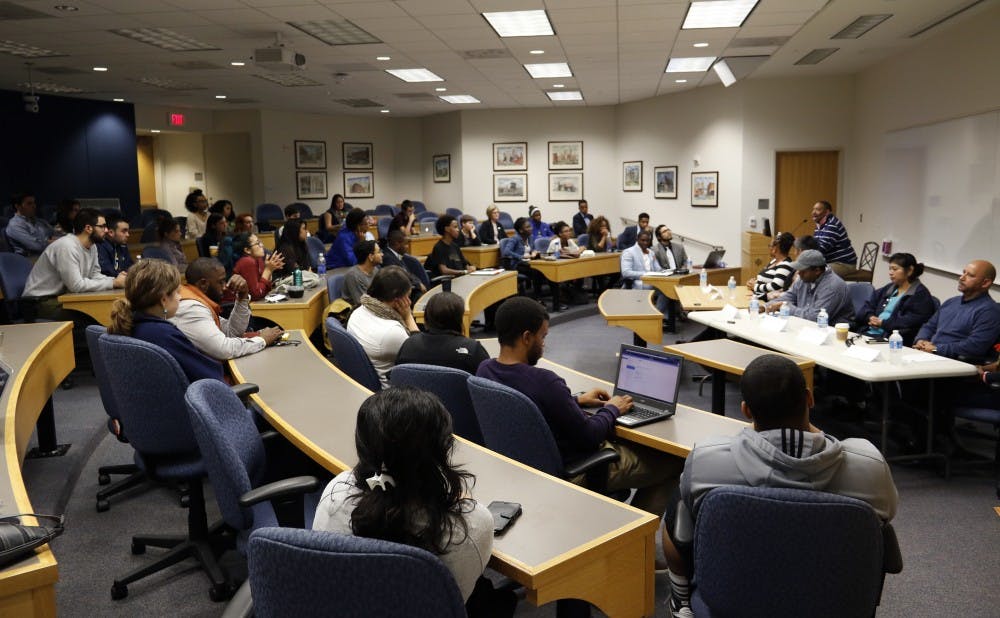A panel of Duke community members illustrated the daunting day-to-day work and social environment navigated by black and Latino people on campus at an event Tuesday night.
Lambda Upsilon Lambda and Alpha Phi Alpha fraternities jointly hosted “Salt of the Earth–A Conversation on Brown and Black Labor at Duke” at the Divinity School. Moderated by Sean Palmer, assistant director of the Mary Lou Williams Center for Black Culture, the panel featured a group of six black and Latino individuals representing different areas of Duke. Participants emphasized the challenges they face on campus to a crowd of more than 50 people.
“In terms of credibility being questioned and having to prove yourself, that happens every day,” said Adrienne Stiff-Roberts, associate professor of electrical and computer engineering. “It never goes away. It never stops.”
The panelists agreed that members of minority communities at Duke feel a deep-rooted stigma from their peers on and off campus. When Palmer asked the panel to address an old alumni quote that “going to Duke as a black person is like going to dinner at a plantation,” panelists admitted that the notion could not be dismissed.
“I think there’s a lack of respect for each other all the way across the board,” said Wallace Burrows, lead food service worker at Marketplace. “You can’t change people, but you can change yourself.”
Antonio Viego, associate professor of literature and and romance studies and director of undergraduate studies, suggested that some students are unknowingly influenced by underlying racial sense of racism exhibited by some students.
“In my intro to Latino studies course, I’ve had four papers that I would describe as pretty racist,” he said. “It’s taken me two days just to write the comments for one paper because I’m trying to do it in such a way that you let the person know that this is really a mess and this is really dangerous and you can’t talk like this anymore.”
Housekeeper specialist Rosa Varela explained that despite Duke being the best environment she has worked in, it is inevitable that “some students don’t like several people, like Hispanic people.”
The main remedy to the unspoken discrimination, the panelists agreed, is to understand the present social climate and to pick the battles to fight.
“If you confront every single slight, number one, you will find your progress impeded and number two, you will drive yourself crazy,” Stiff-Roberts said. “Sometimes you have to learn to just let it go.”
Senior bus driver Jose Valencia expressed his positive experiences working at Duke. He alluded to the racial stereotypes Latinos face but felt that the University was a comparatively open environment.
“As a Latino, it gives me the opportunity to express myself and prove them wrong to show that Latinos are really hard-working people,” he said. “When we get the opportunity, we want to take advantage of it.”
Despite the underlying discrimination black and Latino communities feel on campus, panelist Morgan Ramsey, a senior, said that minority students need to check their own privilege. She argued that too many students were dismissing other members of the Duke community based on their socioeconomic status.
A number of panelists took issue to a previous comment made by Dean of Undergraduate Admissions Christoph Guttentag that an increase in Latino students at Duke would make the University a more attractive option for students who would not have considered it before. Viego said the implication that the students were being brought in to serve as recruiters was “odd.”
“I’ve always felt very strongly that if the school wants to increase the number of underrepresented minorities they should just do that,” Stiff-Roberts said. “Duke has the resources to do that. They don’t need to get students to do that for them.”
Viego further criticized the administration for its neglect of the Latino studies program, explaining that while its peer institutions have well-established programs, Duke’s is based on the efforts of two core faculty whose primary focus is in the department.
“Frankly, I think it’s scandalous how this University has responded to Latino studies and Latino students. I can’t believe more of us are not appalled by this,” he said. “The administration [couldn't] care less about a more extensive program.”
To the panelists, the issues at Duke are a microcosm to the racial inequality that continues to hamper society as a whole.
“You never escape it. All you can do is learn how to deal with it,” Stiff-Roberts said. “Talking about the climate at Duke, that’s the climate of the world and of life. So think of this as a training ground.”
Get The Chronicle straight to your inbox
Signup for our weekly newsletter. Cancel at any time.

